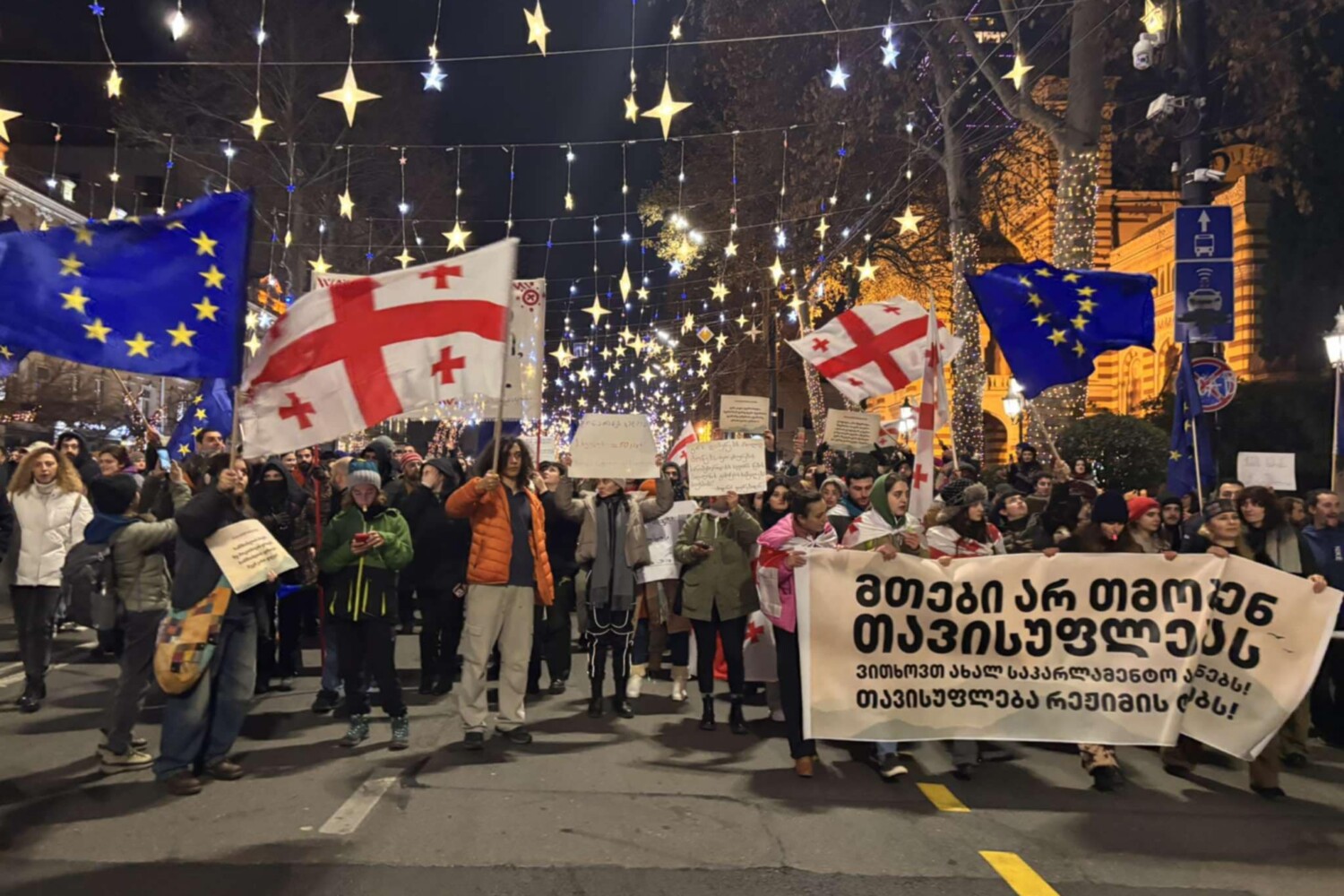Georgia is engulfed in a deep, multifaceted crisis. After the parliamentary elections on October 26, the ruling party declared a decisive victory. However, President Zourabichvili and opposition parties condemned the elections as illegitimate, citing widespread fraud and illegal practices, and called for a rerun of the elections. The public’s deep post-election frustration was further aggravated when Prime Minister Irakli Kobakhidze announced on November 29, 2024, that his government was suspending accession negotiations with the European Union until 2028.
The announcement sparked mass public mobilization and protests of an unprecedented scale because it directly contradicted Georgia’s long-standing and widely shared national identity. Georgia’s crisis can best be understood as what scholars call an ontological crisis—a situation that unsettles a nation’s very conception of itself, prompting strong reactions and emotional responses aimed at restoring consistency to the collective national narrative.
The most recent wave of protests is not an isolated incident but rather the boiling over of a crisis that Georgia has been experiencing since February 2022, when Russia launched its full-scale invasion of Ukraine.
Georgia has encountered numerous challenges in its transition to democracy following a long period of Soviet rule, but the current crisis is qualitatively different from earlier ones. Multiple politicians since 1991 have gained power with democratic promises but abused their authority while in office, weakening institutions and eroding public trust. Yet one aspect remained mostly consistent: despite their private convictions, Georgia’s leaders largely promoted an overarching national identity that was pro-European and anti-Russian. European-ness has been hard-wired into Georgia’s identity since the collapse of the Soviet Union (and, in important ways, far longer than that). Its quest for EU and NATO membership is so central to its national identity that it is written into its constitution, and every recent Georgian government has prioritized progress toward European integration as a central foreign policy objective. Since 2022, the current government has increasingly called into question its own commitment to that long-term national goal, framing its policies as prioritizing security—avoiding Ukraine’s fate by not unduly antagonizing Russia. In contrast to such equivocations, however, Kobakhidze’s announcement marked an unequivocal step away from Europe and toward Russia—a move that struck many Georgians as a betrayal of their national identity.
Under Russia’s Shadow
Georgia has faced significant challenges due to its limited capabilities, its tense relations with Russia (which in 2008 forcibly seized Georgia’s territories), and its lack of membership in the European Union and NATO. The Georgian Dream Party came to power in 2012 by framing itself as the party of “peace,” promising to avoid further conflicts with Russia while continuing to pursue Georgia’s long-standing European aspirations. This message resonated with many, especially as the government made clear progress toward EU integration—notably achieving the EU-Georgia trade agreement (DCFTA) in 2016 and visa liberalization for Georgian citizens in the Schengen area in 2017. Before 2022, the government’s self-declared “non-irritation” strategy for navigating Georgia’s challenging geopolitical situation proved sustainable: even if there were a few notable instances of significant public backlash against government rhetoric or actions that appeared pro-Russian, the broader public took comfort in its tangible record of progress toward European integration.
Notably, public grievances against the Georgian Dream have grown over the years, and its ability to retain power amid decreasing popularity has been bolstered by the weaknesses of Georgia’s opposition parties.
In this context, what united most Georgians was not any specific leader, party, or socioeconomic issue but rather the national narrative that portrayed Georgia as European and anti-Russian.
Russia’s full-scale invasion of Ukraine in February 2022 profoundly affected Georgia’s politics due to the latter’s precarious geopolitical position and its preexisting relationships with both parties involved.
The war re-triggered memories of Georgia’s 2008 experience (with associated traumas) and reignited fears of experiencing another Russian attack. While its government had consistently entertained such fears in its primary narrative to maintain power, positioning itself as the guarantor of peace, that strategy had backfired at times when the risks appeared to be overexaggerated and critics saw government officials as downplaying other significant issues beyond the Russian threat.
Such a brazen attack on Russia’s sovereign neighbor once again brought security to the forefront. With most Georgians seeing Ukraine’s war as their own and wishing for Russia’s defeat, the war created a broad-based societal demand for moral clarity from Georgian leaders. Yet such moral clarity directly contradicted the “pragmatic” “non-irritation” foreign policy approach that Georgian Dream had upheld since 2012.
Witnessing Georgia’s most prominent and historic threat brazenly violating international law and seeking to extinguish a friendly neighbor, many Georgians interpreted even statements of neutrality from politicians as pro-Russian.
As the ongoing major war created pressures for observers both near and far to demonstrate clear positions, Georgia’s prime minister and most in the ruling party increasingly shifted from a somewhat neutral stance towards more explicitly anti-European and pro-Russian rhetoric and policies. Notably, President Salome Zourabichvili offered a prominent counterexample by consistently and actively adhering to Georgia’s overarching national narrative. From the moment Russia launched its full-scale invasion of Ukraine, Zourabichvili condemned the aggressor, showing strong support for Ukraine and clearly expressing Georgia’s enduring European perspective and desire for EU integration. She frequently drew parallels between Georgia’s and Ukraine’s fates, highlighting their fight against a common enemy and their shared vision for a European future. In an article published earlier this year in Global Studies Quarterly, I analyzed how the increasingly divergent positions of Zourabichvili and former Prime Minister Irakli Garibashvili amidst this ongoing crisis reflected the compartmentalization of insecurities: the latter focused on war and economic stability, while the former emphasized the importance of upholding a pro-European national vision and foreign policy. Their split was already apparent, though not yet complete, during the 2022-2023 period that article surveyed. Since then, the ruling party and its new prime minister accelerated a more overtly pro-Russian and increasingly authoritarian turn that culminated in Georgia’s October 2024 parliamentary elections, which Zourabichvili and opposition parties denounced due to widespread fraud and illegalities. The post-election government, seen as illegitimate by many inside and outside Georgia, doubled down by halting Georgia’s EU negotiations and leading the country into an easily predictable yet deep crisis.
In sum, the crisis that is currently unfolding in Georgia can be seen in important ways as a byproduct of Russia’s 2022 full-scale invasion of Ukraine. From the outset, it has been fundamentally ontological, with many in the country seeing their collective national identity being threatened by their own government’s actions and reacting accordingly. Already in 2022, within days of Russia’s invasion, Georgia saw multi-day mass public demonstrations in support of Ukraine. Such protests took place worldwide, especially in capital cities across Europe. Georgia’s protests were different, however. They not only supported Ukraine, they were also emotional manifestations of Georgia’s national identity and its struggle for meaningful independence, which Georgian citizens recognized as paralleling Ukraine’s experience. This dimension of the Georgian anti-war protests—as well as subsequent protests against its government’s “foreign agent” law and the recent announcement of suspended EU integration talks—was inescapable: amid seas of Ukrainian flags waved countless Georgian and European flags, as well as banners with slogans including “Never Back to USSR” and “We Are Europe.”
Conclusion: The Power of Civil Society
Georgia’s crisis has accelerated dramatically over the past few weeks, highlighting two vastly different scenarios for moving forward that each entail significant dangers and hopes. Within the Georgian societal context described above, the government’s decision to explicitly turn anti-European and pro-Russian is political suicide unless combined with the decision to abandon any meaningful semblance of democracy. Recent weeks have revealed this troubling shift: security forces have violently suppressed peaceful protests, illegally detaining and torturing many, while simultaneously, the ruling party has accelerated legislative changes aimed at further consolidating its power and suppressing dissent.
In this critical moment for the country, unprecedented public mobilization and widespread protests symbolize the hope that a strong and sustained societal movement can succeed in restoring constitutional order and returning the nation to its pro-European path. The government’s escalation of repressive measures has not decreased protests; the opposite is true.
The protests have grown in size and reach, drawing participants from all regions and various segments of society, and displaying a spontaneous yet effective diversification of self-organization and public disobedience strategies.
Many different dimensions of this unprecedented wave of protests and civil disobedience deserve dedicated analysis. They vividly illustrate civil society’s agency, which often goes overlooked in domestic and especially international relations. Political scientists and commentators alike often equate a nation-state with its government—which is often understandable but also misleading. While capturing society’s relatively diffused expressions of agency can be hard, it is always part of the nation-state, shaping its domestic and foreign policies in various ways. Critical situations demand critical responses, illuminating many underappreciated actors with different degrees of organization. Georgia’s crisis shows that when a government directly undermines a widely-shared national narrative and collective purpose, it may provoke civil society to act even in the face of brutal force. Many factors will influence the outcome of the current crisis. Georgia’s subsequent regime type and political alignment will have significant implications not only for itself but also for the wider region and, due to Georgia’s strategic location at the crossroads of East and West, for global politics as well.
Eteri Tsintsadze-Maass
Ph.D., she is an Assistant Professor of Political Science at Hampton University. Her research focuses on international relations, security, and the ideational underpinnings of threat perceptions and political behavior.




